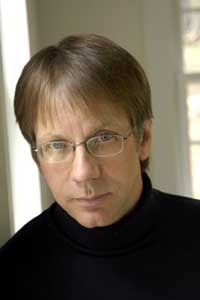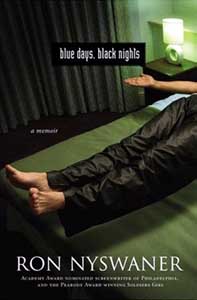-
- Same-sex marriage moves to top of election topics
- Domestic partner benefits involved in Proposal 2 debate
- Ohio Supreme Court rejects legal challenge to same-sex marriage
- Census snapshot of gay and lesbian service members and vets
- Schools should be kept out of same-sex marriage debate
- Mayor’s appointee resigns over New York domestic partner policy
- National News Briefs
- World News Briefs
Arts & Entertainment
Black and blue
An interview with Ron Nyswaner
Published Thursday, 28-Oct-2004 in issue 879
Acclaimed screenwriter Ron Nyswaner, the man who wrote the screenplays to the movies Philadelphia, Swing Shift and Mrs. Soffel, as well as the award-winning Showtime production Soldier’s Girl, has just published his revealing memoir Blue Days, Black Nights (Advocate Books, 2004). In it, Nyswaner details his spiraling drug and alcohol abuse and subsequent relationship with a European male prostitute he meets in a bar in Los Angeles. At turns funny and tragic, Nyswaner’s story is the kind of book that you simply can’t put down, made even more so because it is true. I recently spoke with Mr. Nyswaner about his memoir.
Gay & Lesbian Times: Throughout your screenwriting career, you have written scripts that were based on fact and scripts that were fictional. When it came to writing Blue Days, Black Nights, was there ever any question as to whether you were going to tell your story in memoir form versus fictionalizing it in novel form?
Ron Nyswaner: No, I never really wrestled with that. I think I really wanted to enjoy exploring truth that wasn’t disguised. Anything fictional has a lot of truth in it, as well, but it’s always sort of hidden beneath imagined characters and situations. I just wanted the pleasure of being a journalist about my own life.
GLT: It’s interesting that you would say that because I got the sense that when you were writing about your family, you were discovering things about your relatives, family secrets and such, that you might not otherwise have realized or become aware of. Would you say that that is true?
RN: Yeah, I think that’s exactly true. I think, again, that that’s one of the benefits that I got from deciding to write a memoir. I sort of researched my own life and my own soul and my own thoughts, so I couldn’t hide beneath a character or the need to entertain. A memoir is, by definition, mostly true. When I was perhaps afraid to face certain things about myself, about my love for Johann, about my addiction, about my family, because I was writing a memoir and I am a fairly honest person, therefore I was forced to really dig deep and face the truth about all of those thing. If you’re going to take a hard look at other people in your life, you better turn the same sort of gaze at yourself. That’s something that I really tried to do in the book, was to be a little unsparing about myself and my own sort of flaws and responsibility for the thing that were going on in this really dark period in my life.
GLT: It was also fascinating the way that your connections to other families – your ex Alan’s mother, Gloria, and Johann’s brother, for example – also seemed to function as a means of helping you in dealing with your own familial relationships. Would you agree?
RN: Yeah, very much. And I also think that that’s something, as a gay man, that I am forced to think about. I have been required, as all gay people are, to redefine what it means to be part of a family. Part of our experience is that we surprise (laughs) our birth family by telling them and finding out for ourselves who we really are. So there is that adjustment that has to be made. Then we have to go out into the world and we say to the world, “We’re going to have a family, too. It’s just not the kind of family that you expect us to have.” … I grew up in small-town America at a time when it really was small-town America. … I don’t think that I stated this in the book, but when I was growing up, I never heard the word homosexual or the word gay spoken aloud. I think I was in college before I heard either of those words spoken aloud. I heard other, derogatory words, like faggot or pussy, and they were sometimes directed at me, or I was always relieved when they were directed at someone else for a change (laughs). But I think I was 20 before someone in my presence said the word homosexual. It was a different time. I had to go out and find out how I can be a homosexual who remains connected to my family and also has a family of my own. How do I do that in this world?
GLT: What was it like putting your experiences with serious drug use on paper?
RN: (Long pause.) Sometimes it was a little frightening, because it would excite me to think about it because I am a person in recovery. I don’t want to use drugs again, I don’t want to drink again, but sometimes in detailing the oblivion that you can achieve with the stuff, and the sexual highs, sometimes in doing that, it was frighteningly exciting. Let’s face it; we wouldn’t do drugs if they weren’t fun. If the first time you did crystal meth, you didn’t have fun, why would you do it again? That’s the seductive power of drugs and alcohol; they’re fun for quite a while until one becomes addicted to them. I would say, also, that it was really helpful to me, as I described the darker places that drug use took me to, because I have now committed it not only to memory, but also to paper. If I am tempted to pick up a drink or some drug to abuse, all I have to do is turn to my own book (laughs) and I can remember, and the whole world can now remember (laughs) where that led me. I really don’t want to have my stomach pumped again. I have to say that if you’ve never had your stomach pumped, don’t. It is a really unpleasant experience that I hope to avoid again for the rest of my life.
GLT: As detailed as the drug use is in the book, the sexual descriptions are less detailed. Was that a conscious decision?
RN: I don’t know if it was conscious. I think it was the result of when one is high, as I always was in that period my life, when I had sex, the details are really vague. If you’re on crystal meth, you can have sex with someone for 48 hours and you really can’t remember what you did. You must have been doing something. If you were forced to tell somebody what you did, it would be hard to say what you did exactly. That drug-induced oblivion is so much a part of being a drug addict that I think that that accounts for the lack of detail.
GLT: Obsession is a pivotal theme in your book. Do you think that obsession is more prevalent in the gay community than it is among straight people?
RN: No, I don’t think anything is more prevalent among gay people than among straight people. Gay or straight, the range of human experience is available to all of us. Maybe gay artists have gone through the period of required political correctness, and maybe now what we can do, because we do have a few positive images of gay people in the media, maybe what we feel we can do now is explore the darker aspects of our character. I think there was a period there when we were reluctant.
GLT: We were on our best behavior.
RN: Right. We really wanted to convince the world that we were just like straight people, except gay. “Don’t be afraid of us” – that was our motto. “Don’t be afraid of me, I’m just your next door neighbor. I like to go to the Home Depot and cookout on my grill.” I think that we’ve survived that period; it was a necessary period. And now we’re willing to see ourselves and the whole full range of humanity that we can be; the way that we embrace “Queer As Folk”, for example, and its promiscuous characters. I think there would have been a time when people in the gay community would have been outraged because, “You’re telling the world that we’re all sex maniacs.” We’re not all sex maniacs, but some of us are, sometimes (laughs). Just like some straight people are. I think we’ve survived that period and we are onto something else.
GLT: Lastly, since you are best known for your screenplay work, are there plans for a screen adaptation of Blue Days, Black Nights?
RN: Not yet. We’ve been very protective about the book. We’re hoping to entertain those plans as the book comes out. I have ideas for it in my head. I hope it will be a really fun, entertaining kind of exuberant crazy movie like, say, Trainspotting or Party Monster. Not something that’s trying to teach anyone a lesson about how they shouldn’t be a drug addict, but something that’s fully alive even though it’s covering some of the darker aspects of life.
|
|
Copyright © 2003-2025 Uptown Publications



